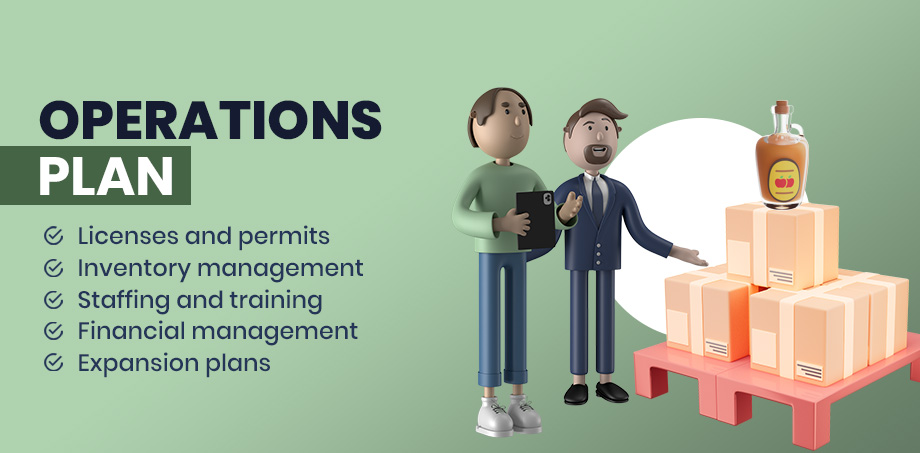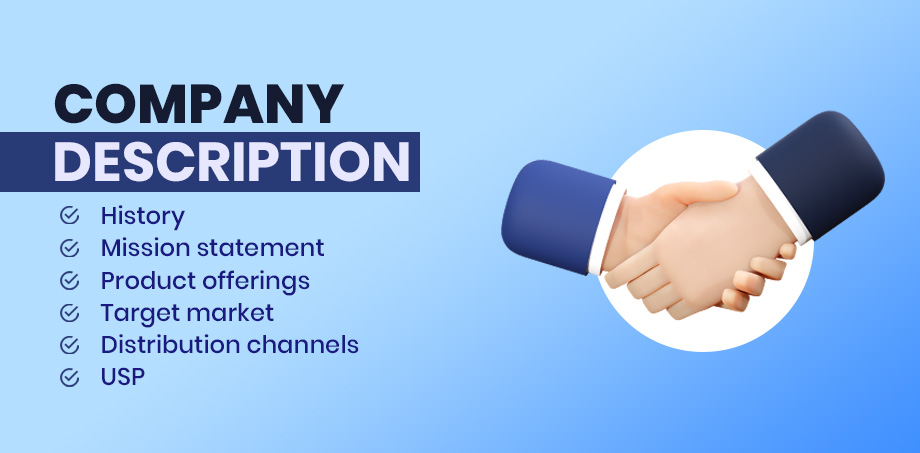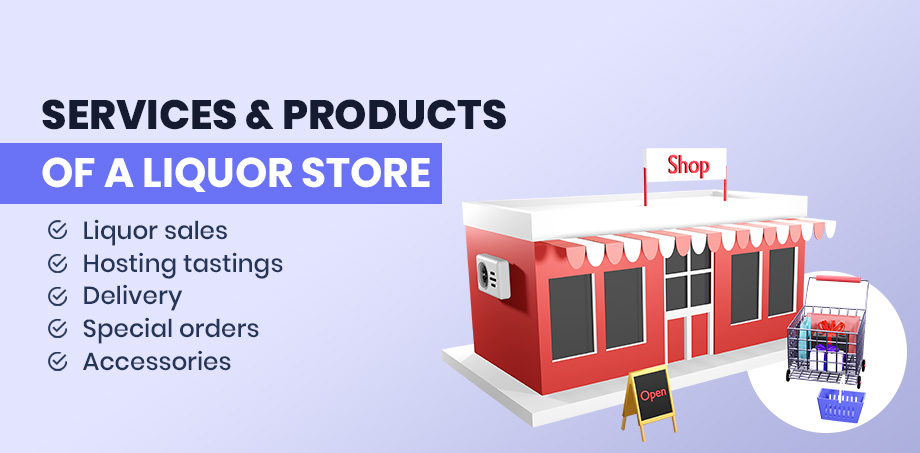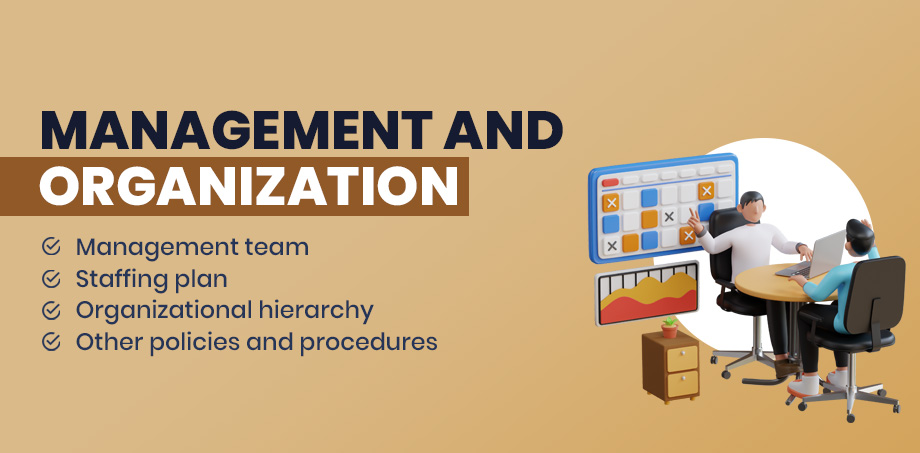A Comprehensive Guide for a Liquor Store Business Plan




“Quick summary” Over the past few years, the liquor shop sector has expanded. According to these figures, the United States alone is home to an industry worth more than $59 billion.
As intriguing as these figures may be, let us alert you that opening a liquor store is among the most difficult retail operations. When rules are stringent, competition is fierce, and startup costs are high, you can't afford to not plan your firm as thoroughly as possible from the beginning.
An effective business plan can save the day in these circumstances. Creating a liquor store business plan template that addresses all important factors and keeps your business on track can be difficult.
What happens if you overlook something crucial and your company suffers as a result?
To assist you in getting started, we have created this liquor store business plan and some useful ideas and tactics for business owners to employ when establishing their own liquor store company strategy.
What happens if you overlook something crucial and your company suffers as a result?
To assist you in getting started, we have created this liquor store business plan template and some useful ideas and tactics for business owners to employ when establishing their own liquor store company strategy.
Let's get started!
A Detailed Liquor Store Business Plan!
In our detailed guide to get you started with a liquor store, we will be penning down everything you need to know about the same. We will cover everything step-by-step to help you out! Right from market analysis and creating a company description to dealing with marketing and operations - it will be your go-to guide.
So, let's get a cup of coffee and your notepad to get started right away!
Liquor Store Business Plan!
1. Industry Analysis
As we just stated, the liquor sector is enormous and expanding quickly. The beer, wine, and liquor store industry in the United States is worth a whopping $72.5 billion and has increased at a rate of about 5% per year over the last five years. It has expanded by more than 20% alone in the last three years.
There is a significant opportunity for the entrepreneur in the liquor industry with the projected 10.5% annual growth of the global alcoholic beverage market through 2025.
The main cause is the rise in global alcohol use, which is attributable to the younger population's increased acceptance of alcohol and the rise in disposable money.
However, because the market is so lucrative, it also draws a lot of competitors. So to outperform your competitors and stand out from the crowd, proper planning and comprehensive strategy is the key.
2. Customer Analysis
Comprehending your target demographic if you run a liquor business is crucial. Additionally, it is quite important for you to thoroughly investigate your subject matter and describe your research in your business plan.
You can bet that customers have already done their research on customer review websites and product ratings before they arrive at your liquor store. In many cases, the shopping experience is already nearly complete when a customer visits your business.
As a result, be sure to study your existing clientele before starting your liquor business to reach a wider audience and generate higher revenues.
To meet such needs, you should be aware of the kind of alcohol that locals regularly consume, how their consumption varies with the seasons, and where you'll be getting your supply. You would have to go through this process with any business, but you should be more careful while starting your liquor store as consumers are very rigid about this one.
Here's a quick tip: Make sure you determine your USP keeping in mind your target audience to generate better results.
3. Competitive Analysis
The market for liquor stores is extremely competitive; just the top 50 enterprises account for 25% of sales. Convenience, marketing, and affordable prices are three factors that many buyers of liquor stores consider when making purchases.
Setting your company apart from the competition is essential because smaller liquor stores, not industry behemoths, currently control the market. With the correct market research, your liquor store can maintain its competitiveness with the most recent trends while fostering client loyalty.
A thorough investigation of the market's most effective sales and marketing methods should be the first step in your competition study. This breakdown ought to examine your rivals and any prospective niche markets you might be interested in. The next stage would be to identify your unique selling proposition, or USP, which is what sets you apart from competitors.
Once you have conducted market and competitor research focused on your brand positioning and other related tasks, you will have the vital data you need for an efficient liquor store company plan. Make a list of the benefits of your services after analyzing the strengths and shortcomings of your primary competitors.
4. Business Structure
You must include your choice of business structure in your business strategy because it is vital. Your decision to form an LLC, corporation, or partnership will impact your everyday operations, taxes, and other factors.

- Sole proprietorship: This describes a business that is owned and operated by just one person, with no formal separation between them.
- General partnership: When two or more people start a commercial venture, a general partnership—the simplest kind of partnership—is automatically formed.
- Limited liability corporation (LLC): This is one of the most common types of business entities for small firms. An LLC shields your personal assets because they are shielded from the company's debts and obligations.
5. Operations Plan
You need to curate a comprehensive operations plan about your liquor business's day-to-day operations and other related important things which affect the operations of your business as a whole.
Additionally, it's crucial to understand the process of how to get a liquor license in the USA, as it is a vital aspect of operating a liquor business legally and responsibly. Ensure that your operations plan includes a detailed section outlining the necessary steps and requirements for obtaining a liquor license in your state or jurisdiction.
This will help you navigate the regulatory process smoothly and ensure compliance with local laws and regulations.
So, let's find about the things you should include in an operations plan for your liquor business:

- Licenses and permits: You should state the types of licenses and permits you have to operate your business, including any state or local regulations that need to be followed. Ensure that all permits and licenses are up-to-date and that you are compliant with all applicable laws.
- Inventory management: In your operations plan, you need to mention your inventory and how you will manage it effectively to prevent overstocking or understocking.
- Staffing and training: In the operations plan, you will be writing everything about your staff - currently working with you or if you are planning to hire.
- Financial management: You need to mention the budget for your liquor business that includes projected revenues and expenses, as well as plans for managing cash flow and handling taxes.
- Expansion plans: If you are planning to expand your liquor business in the future, include details on your growth strategy in your operations plan. It could include plans for opening additional locations, expanding your product offerings, or entering new markets.
6. Executive Summary
A well-thought-out executive summary is essential for any company plan. An executive summary summarizes the most important elements of your company plan. Your company's selling points are comprehensively mapped out in a final executive summary, which also includes important details.
The following essential components make up a well-organized executive summary:
After reading your executive summary, your investor or business partner will be better able to comprehend the details of your company. An outsider can learn everything about your company from this detailed summary.
Here are the following crucial things you can add to your executive summary:
- Everything about your business
- A brief description of your target market and competitors in the location.
- What is your mission and vision for the future growth of your business?
- Even include the financial needs of your liquor business plan, including the expenses and capital requirements.
Take out a considerable amount of time and prepare a presentable business layout for your business.
7. Company Description
Your brief description of your company should be a must-have in your business plan.
So here are the following things you can include in your company description:

- History: In this section, you need to provide a brief overview of the company's founding, the founder's name, key members, etc. It will help shareholders understand the background and boost the company's reliability.
- Mission statement: You also need to include your business's vision and mission statement, which includes financial growth and 5-year projections, along with guiding principles and a roadmap to go ahead.
- Product offerings: In this section, you need to cover the liquor products you will be offering, followed by the brands you will be serving and services for your customers.
- Target market: Your shareholders or loan leaders also want to know about the target market and how much you know about them, so that also must include in your business plan.
- Distribution channels: Then, you need to clarify your distribution channels, including how a company distributes its products, including any partnerships or collaborations with other businesses.
- USP: Clarifying and writing your USP in your company description is among the most crucial things, as you want your shareholders to know how your liquor business differentiates from other liquor businesses in the market.
8. Market Analysis
You will have an advantage over all of your competition if you research the liquor store firms in the area. You must be aware of what to expect and who your competitors are; otherwise, you will begin unprepared and wind up losing more than you anticipated.
To accomplish this, you must extensively evaluate the market, which includes spending time researching the industry, and your rivals and expounding on the target market.
One basic step you ought to undertake in the market analysis process is to visit other liquor shop competitors in your neighborhood. Make a list of the things you enjoy and dislike about these shops when you visit them.
We also recommend doing the following things:
- Tracking the number of customers entering and leaving various retail outlets by spending time outside.
- Who exactly are their customers?
- Does this idea sound like it would be profitable?
- What can you change to make yourself stand out?
Observing and taking notes on other firms is one of the finest methods to understand what's working in a market and make judgments appropriately.
9. Services & Products of a Liquor Store
Next up are services you will be provided in your liquor store that must be included in your business plan. A liquor store typically offers a range of products and services related to the sale of alcoholic beverages, including:

- Liquor sales: Liquor stores sell a wide variety of alcoholic beverages, such as wine, beer, spirits, and liqueurs. They usually carry a range of different brands, styles, and prices to cater to different customer preferences.
- Hosting tastings: Some liquor stores host tastings where their customers can sample different products and educate customers more about the production process and history of various alcoholic beverages.
- Delivery: Some liquor stores offer delivery services to customers who are unable to visit the store in person. It is particularly convenient for customers hosting events or parties who need a large amount of alcohol.
- Special orders: Many liquor stores can even offer special orders for their customers who are looking for specific products or rare vintages that are not typically stocked on their shelves.
- Accessories: Some liquor stores also sell accessories related to the consumption of alcohol, such as glasses, decanters, wine openers, and cocktail shakers.
10. Marketing
To market your liquor business effectively, you need to follow the 4 P's of marketing and get the best results.

- Product: Product is at the heart of marketing. So, you need to dig down, research, and choose the best products for your customers. Go into detail about the liquor brands and particular products you'll be selling at your liquor shop and attract your customers out there!
- Price: Pricing is another crucial factor to keep in mind while curating the marketing plan for your business. Document the pricing you'll provide and how they differ from your rivals. Fundamentally, you are outlining the goods you provide in the product and price sections.
Make sure you are pricing your liquor and other products competitively, offering a reasonable profit margin and giving your consumers a further competitive edge.
- Place: Place pertains to the physical location of your liquor store. The location has a significant impact on drawing in clients and creating a marketing strategy that appeals to your target market. So, make sure you ace it.
- Promotions: After you have decided on a price, place, and product - you need to decide on promoting your liquor business effectively.
Here are some of the best ways to do it well:
- Establishes an appealing Web Presence
- Develop a stunning Social Media Presence
- Banner Ads for Local Venues
- Discount & Coupon Promotions
- Print media
- Community Events
- Partnerships/Sponsorships
11. Management and Organization
Determining your managerial staff and organizing your liquor business is among the crucial things that you should include in your business plan.

Here are the following things you should include:
- Management team: Firstly, you need to add members of your management team and their relevant experience. It includes the owner(s), general manager, and any other managers or supervisors you plan to hire. Make sure to include a brief overview of their roles and responsibilities, as well as their qualifications and accomplishments.
- Staffing plan: Provide details on how you plan to staff your business, including how many employees you will hire, what their roles and responsibilities will be, and how you will recruit and retain them. Also, outline any training or development programs you have in mind for your staff to operate your business successfully.
- Organizational hierarchy: After that, you need to describe the overall structure of your organization, including how it will be organized, what departments or teams you will have, and who will be responsible for each area. It will help investors understand the hierarchy of your business and how decisions will be made.
- Other policies and procedures: You also need to outline the policies and procedures that will be in place to ensure that your liquor business operates smoothly and in compliance with all relevant laws and regulations.
12. Financial Projections
You must conduct an in-depth study in order to determine the comprehensive financial estimates. The best way to find out is to observe what is happening at the nearby liquor stores. You can also look at their prices, see how much they are selling, what they are selling, and other things around. You can determine your monthly and annual revenue and expense predictions by doing some simple math.
A financial plan helps you estimate how much capital you'll need to start your firm, what expenses you'll incur, and how much you'll need to earn on a daily basis to break even. Yes, it will become somewhat technical. But that is what running a business is all about.
With this information, you can make your future financial projections and add them to your business plan. These projections are very important in your business plan to get you going in the right direction and even appeal to your investors.
Quick Tip: We advise you to make your short terms and long-term financial projections.
13. Funding Requirements
Along with planning how to open your liquor store, you also need to consider how you will maintain its financial viability.
The distinction between a profitable liquor store and one that is having financial difficulties is good financial management. Building a long-lasting business might be difficult if everything about it is going well, except for your funds. It is crucial to outline your expenses of goods sold (COGS), profitability plan, sources of funding, and a funding timetable in your liquor shop business plan.
In general, this section of your liquor store business plan should make it abundantly obvious where your capital is coming from and how much funding you will require for operational activities and other activities.
When it comes time to make an investor pitch or to begin seeking funding for your liquor store, this will be crucial. So, make sure to conclude everything in a clear and concise manner to give a brief idea about your finances to investors and lenders.
Conclusion
So, here's a wrap on curating a detailed business plan for a liquor store. And a well-crafted business plan will help you in sticking to your defined goals, your business finances, and your organizational structure. It will be the go-to guide for you, shareholders, or bankers.
By carefully considering each aspect of your business, from your products and services to your marketing and sales tactics, you can create a comprehensive business plan for a liquor store that drives you to success and helps you stick to your mission and vision(No matter what).
As you work on your business plan, remember to stay flexible and adaptable to your business changes, market changes, competitive changes, or your customer's changes. The liquor industry and the people around it are constantly evolving, and you may need to make adjustments to your plan as you learn more about your customers and competition. Stay open to feedback and be willing to make changes as needed to stay on track.
So, Whether you are starting a new venture or looking to expand an existing one, a well-crafted business plan is a powerful tool that can help you achieve your goals and build a successful and profitable liquor business.
To know more about creating a detailed business plan or getting expert advice, we are your go-to partner for the same.
Frequently Asked Questions(FAQs)
01 What are the Ongoing Costs of Operating a Liquor Store?
The ongoing expenses for a liquor store can vary depending on a number of factors, such as location, size, inventory, and operational costs.
Here are some typical expenses that a liquor store owner might incur:
- Rent or lease: This is usually one of the biggest expenses for a liquor store, and it can vary widely depending on the location and size of the store.
- Marketing and advertising: Promoting the store and its products is crucial to attracting and retaining customers. Expenses may include print ads, social media marketing, and promotional events.
- Utilities: Electricity, water, gas, and internet bills are all necessary expenses for running a liquor store.
- Insurance: Liquor stores need to protect their business with various types of insurance, such as liability insurance and property insurance.
- Salaries and wages: Liquor stores may require employees to help with day-to-day operations, such as stocking shelves, running the cash register, and helping customers.
- Licenses and permits: Depending on the state and local regulations, liquor stores may need to pay fees for various licenses and permits, such as a liquor license, sales tax permit, or health department permit.
02 How Much is the Profitability of a Liquor Store?
Liquor stores can be profitable, but profitability can vary depending on a number of factors, such as location, competition, pricing strategy, and inventory management.
However, according to industry reports, the average revenue for a liquor store in the United States is around $800,000 per year.
And the average profit margin for liquor stores can range from 20% to 35%, depending on the product mix, pricing strategy, and operational efficiency. However, it's important to note that this is just an average, and profit margins can vary widely based on a number of factors.
In addition to profit margin, it's also important to consider other financial metrics such as revenue, expenses, and cash flow when evaluating the profitability of a liquor store.
03 Do I Need a POS System for the Liquor Store?
A top-notch liquor store POS system might greatly aid your company's success. The key component of the liquor business is probably inventory control. However, your point of sale can also manage payroll and accounting, build a client database, minimize theft, and interact with loyalty programs.
You may even use it to efficiently manage all client transactions while simultaneously updating an inventory in real-time and a customer database. All of these assist you in optimizing your business processes and providing your users with the greatest possible user experience.
04 Can I Get a Startup Loan for My Liquor Business?
Yes, surely. You can easily get a startup loan for your liquor business. The liquor industry must deal with so many regulatory challenges, so it can be difficult. But, if you have all the required licenses and permits followed by proper papers, you can get a startup business loan for your liquor business.
Apart from licenses, permits, and papers - the brief liquor store business plan that clearly outlines your goals, target market, and financial projections can significantly increase your chances of securing a startup loan.
You should also have a solid understanding of the legal and regulatory requirements for operating a liquor business in your area, as this can demonstrate to lenders that you are knowledgeable and prepared.
So, the best liquor store business plan template and comprehensive knowledge in this specific area can help you in securing a loan for your startup.
05 How Much Does It Cost to Create Your Own Liquor Store?
Whether you believe me or not, owning a liquor business is expensive. The initial expenses will be some of the most costly ones your company has ever incurred.
It costs money to secure the location, the stock, and the staff, finish any renovations, install your cash register, and take care of other requirements for starting a liquor store. You must also account for the cost of your licenses and registrations, which may total more than $10,000.
The cost will vary depending on your new liquor store's location, but you should budget at least $100,000 for startup costs.